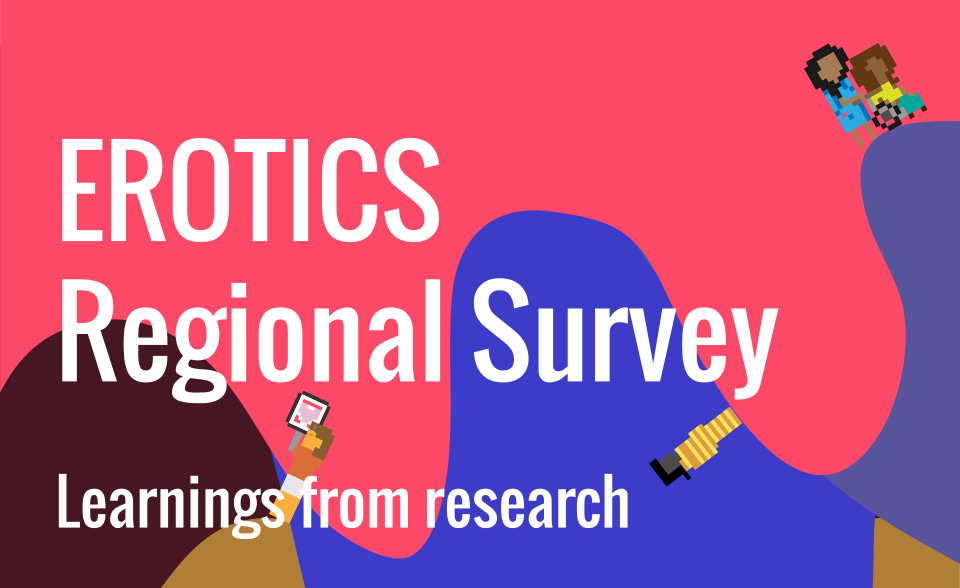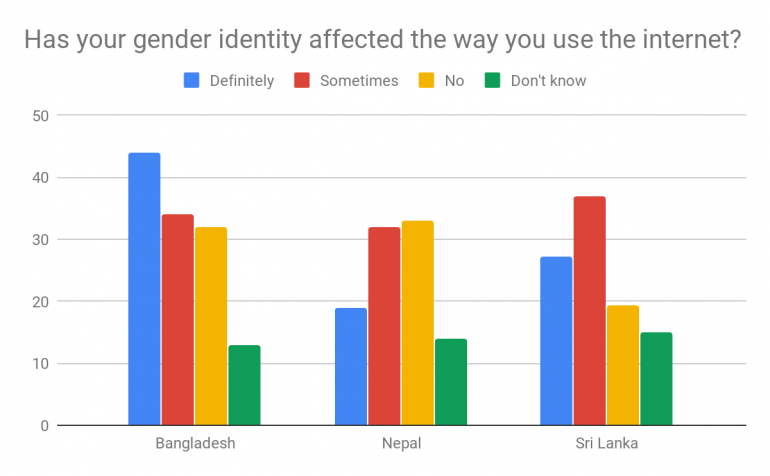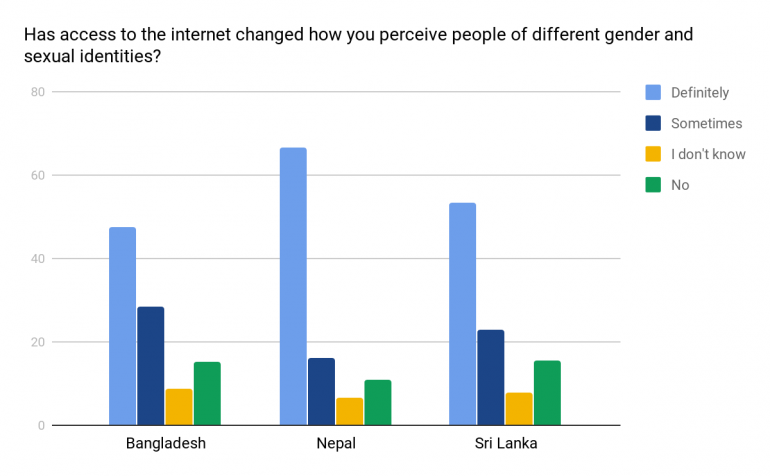
Read the first part of this article: EROTICS Regional Survey learnings (1): reflections on feminist internet research design
Writing a summary of research with participants across age groups, countries, locations, languages seems close to impossible. But the past year of engaging with researchers from Bangladesh, Nepal and Sri Lanka has provided us a lot of insight on how the internet can and is perceived by different groups of people even within our countries. So, to explore the range of experiences captured in the survey, I will be writing through the lens of two of the Feminist Principles of the Internet (FPI) - Access and Usage - to get a deeper look at different patterns that exist within our communities in our region.
To explore the range of experiences captured in the survey, I will be writing through the lens of two of the Feminist Principles of the Internet (FPI) - Access and Usage - to get a deeper look at different patterns that exist within our communities in our region.
The feminist principles of the internet were drafted in Malaysia in April 2014 in a meeting organised by APC that brought together 50 activists and advocates working on sexual rights, women’s rights, violence against women, and internet rights to identify and prioritise what constitutes a feminist internet. Currently there are 17 principles organised in 5 clusters of Access, Movements, Economy, Expression and Embodiment. This EROTICS regional quantitative survey along with an in-depth qualitative survey focused on asking questions under many of these clusters. The participants across each country varied widely. Hence, it is best to see the diversity of responses we received as unique ways of using and being on the internet rather than as a comparative analysis.
The first principle is Access. According to the FPI, Access is defined as: “A feminist internet starts with enabling more women and queer persons to enjoy universal, acceptable, affordable, unconditional, open, meaningful and equal access to the internet.”
Access was a huge conversation across all the country researches. In the Nepal qualitative survey conducted by Body and Data, they spoke to several women with disabilities about their access to the internet, particularly, their access to information on sexual and reproductive health. One of the participants raised the important point that “access to internet doesn’t always come with questions around who has access to it, how are they accessing it and where are they accessing it.”
“Access to internet doesn’t always come with questions around who has access to it, how are they accessing it and where are they accessing it.” – Study participant from Nepal
Another blind participant spoke about the difficulties accessing information because of the screen reader usage and local language information. She said: “I can read the words in English, but I can’t read Nepali words completely. Plus, in order to read pdf, another app is required. So, everything cannot be seen nicely. Sometimes, when people upload pictures, the app doesn’t dictate it. It only says that there’s a photo but we cannot know about the photo, like what the photo is about.” In an exchange with the interviewer, a participant spoke of information around sexuality and how disability plays a role in exposure.
– Interviewer: "Do you really think the information that are provided in the websites are effective and talks more about the sexuality?".
– Interviewee: "Not sufficient. Sometimes people interpret in a very negative way and the materials are not even sufficient to express more about it. When we talk about porn they can’t be associated, like those who can see they can clearly have the view on it but for others audio is the not enough.”
These experiences tell us about the specific ways in which access affects usage for people with disabilities in Nepal. Since few studies have been conducting on this intersection, it would be important to see how this affects other people with disabilities, especially women with disabilities in the region.
Across the three studied, it was noted that access to the internet has improved because of cheaper mobile phones and internet connections. In the Bangladesh study, the researcher Parsa Sanjana Sajid noted: “A survey on mobile ownership revealed that among the 15-65 age cohort, there was a 34 percent gender differential with male mobile ownership at 87 percent, and female ownership at 58 percent; unsurprisingly these gaps get more pronounced with socioeconomic backgrounds, and rural women reportedly had the lowest internet use.” As one queer participant spoke about in the qualitative study done by Sajid: “even if I could access information online, learn, read from available materials, I couldn’t really internalise or absorb that without a space to discuss them.”
This takes us to seeing the links between access and usage (and, of course, expression!) in the feminist principles of the internet. The FPI defines usage as: “Women and queer persons have the right to code, design, adapt and critically and sustainably use ICTs and reclaim technology as a platform for creativity and expression, as well as to challenge the cultures of sexism and discrimination in all spaces.” This broadly brings us to the ways in which people, especially women and queer persons with improved access, use the internet. More access to the internet and more usage results in different things. It is important to note that across the three countries in the regional quantitative survey, it was noticed that many of them felt that their gender identity had not affected the way they use the internet. However, access to the internet had changed their perceptions of gender and sexuality. So does increase in usage of the internet by diverse people improve or change our understanding of the world? It would be a simplistic answer to say yes, but many of the responses show us the ways in which we (un)learn as the internet’s access improves in our communities.

Graphic 1: Has your gender affected the way you use the internet? Comparative data for Bangladesh, Nepal and Sri Lanka show that most research participants feel affected "definitively" or at least "sometimes". Source: EROTICS Regional Survey 2020.

Graphic 1: Has access to the internet changed how you perceive people of different gender and sexual identities? Comparative data for Bangladesh, Nepal and Sri Lanka shows that most research participants definitively perceive a change. Source: EROTICS Regional Survey 2020.
It is important to note that across the three countries in the regional quantitative survey it was noticed that many of them felt that their gender identity had not affected the way they use the internet. However, access to the internet had changed their perceptions of gender and sexuality.
One participant in the Bangladesh quantitative regional survey said: “It has taught me to always ask a stranger what pronouns they prefer before initiating a conversation. It has also taught me to be more mindful of throwing around words like "gay" or "lesbian" lightly or jokingly, because some people might identify as such and find it offensive and hurtful.”
In Sri Lanka, the in-depth interviews conducted by Sachini Perera and Zainab Ibrahim tell a story about changes in empathy but also a reduction in isolation. One participant shared how she learned more about the asexual community through online networks. She said: “I used to think ‘asexual’ was not real – they just don’t want to have sex for some reason is what I thought. But I spoke to some asexual people online, and it blew my mind! It really changed my perspective and I understood that it is so much more about relationships and platonic relationships in society too.” In another case, a participant shared that when she has shared posts that deal with issues of gender and sexual identities, more people approach her to share their personal stories. This has led to deeper connections through the internet.
These experiences give us a brief insight into the experiences, explorations and nuances of using and being on the internet through these three researches.
For more details and experiences, read the full EROTICS regional report, and the country reports here: Bangladesh | Nepal | Sri Lanka.
- 1640 views






Add new comment